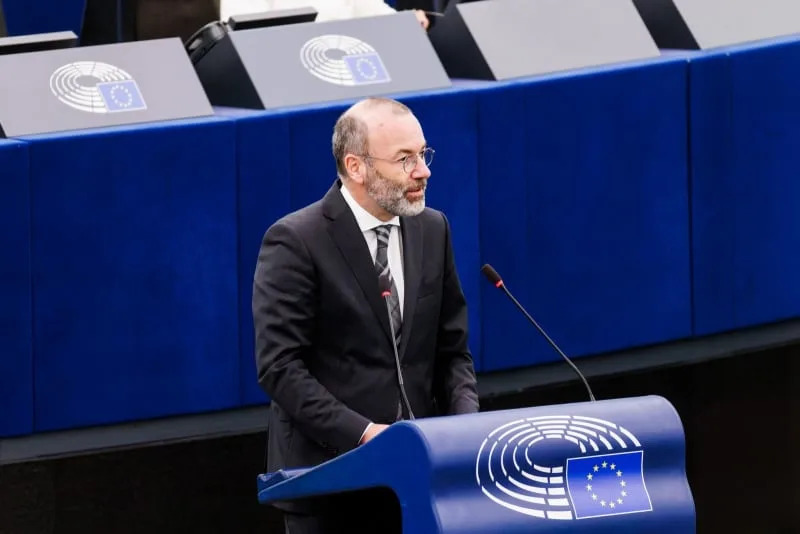World
EU Lawmaker Advocates for Syrian Refugee Returns with Exceptions

The leader of the conservative European People’s Party (EPP) in the European Parliament, Manfred Weber, has expressed his support for the return of Syrian refugees to their home country. In an interview with the mass-circulation newspaper Bild, published on March 3, 2024, Weber stated that those who have the ability to return should do so to assist in the reconstruction of Syria. He emphasized that while Europe provides help during emergencies, the expectation is that refugees will return once conflicts subside.
Weber articulated a clear stance on the legal framework surrounding refugee assistance. “We provide help in emergencies, but when the war is over, you have to return to your home country,” he asserted. However, he acknowledged the complexities involved, advising against strict deadlines for repatriation. “If deportations in the first month are not possible because parts of Syria are still completely destroyed, then it might work the following month,” he explained. He underscored that the principle of return must ultimately be implemented.
The discussion around the repatriation of Syrian refugees comes as divisions emerge within the conservative bloc in Germany regarding this sensitive issue. Weber, a senior politician from Bavaria’s Christian Social Union (CSU), which is the sister party of Chancellor Friedrich Merz‘s Christian Democratic Union (CDU), faces challenges in balancing party unity with humanitarian concerns.
Weber also highlighted the contributions of many Syrian refugees who have successfully integrated into the German labour market. “There are many Syrians in Germany who are making an important contribution here. Do we really want to send all of them back to Syria?” he questioned. He noted the critical roles that individuals with migration backgrounds play in sectors such as health care, emphasizing that these contributions should not be overlooked.
The remarks by Weber come in the wake of a visit by Foreign Minister Johann Wadephul to a devastated suburb of Damascus, which has sparked internal debate within the party. Wadephul’s observations raised concerns about the feasibility of large-scale returns, stating it is “barely possible” for refugees to live there with dignity given the current destruction. His comments have added to the complexity of the ongoing discussions about the future of Syrian refugees in Europe.
As the landscape in Syria continues to evolve, the European Parliament faces pressures to address the status of refugees while balancing humanitarian responsibilities and national interests. The dialogue initiated by figures like Manfred Weber reflects a critical juncture in European migration policy, one that intertwines legal, ethical, and social dimensions.
-

 World3 weeks ago
World3 weeks agoGlobal Air Forces Ranked by Annual Defense Budgets in 2025
-

 World3 weeks ago
World3 weeks agoMass Production of F-35 Fighter Jet Drives Down Costs
-

 Science3 weeks ago
Science3 weeks agoTime Crystals Revolutionize Quantum Computing Potential
-

 World3 weeks ago
World3 weeks agoElectrification Challenges Demand Advanced Multiphysics Modeling
-

 Top Stories3 weeks ago
Top Stories3 weeks agoNew ‘Star Trek: Voyager’ Game Demo Released, Players Test Limits
-

 Top Stories3 weeks ago
Top Stories3 weeks agoDirecTV to Launch AI-Driven Ads with User Likenesses in 2026
-

 Business3 weeks ago
Business3 weeks agoGold Investment Surge: Top Mutual Funds and ETF Alternatives
-

 Lifestyle3 weeks ago
Lifestyle3 weeks agoDiscover Reese Witherspoon’s Chic Dining Room Style for Under $25
-

 Entertainment3 weeks ago
Entertainment3 weeks agoFreeport Art Gallery Transforms Waste into Creative Masterpieces
-

 Health3 weeks ago
Health3 weeks agoGavin Newsom Critiques Trump’s Health and National Guard Plans
-

 Lifestyle3 weeks ago
Lifestyle3 weeks agoLia Thomas Honored with ‘Voice of Inspiration’ Award at Dodgers Event
-

 Politics2 weeks ago
Politics2 weeks agoLanguage Evolution: New Words Spark Confusion in Communication









